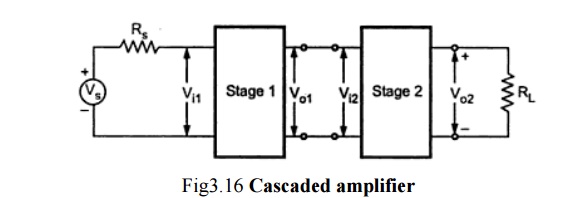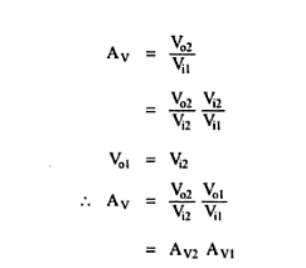Chapter: Electronic Circuits : JFET and MOSFET Amplifiers
Multistage Amplifiers
Multistage Amplifiers
In practice, we need amplifier which can amplify a signal from a very weak source such as a microphone, to a level which is suitable for the operation of another transducer such as loudspeaker. This is achieved by cascading number of amplifier stages, known as multistage amplifier
1. Need for Cascading
For
faithful amplification amplifier should have desired voltage gain, current gain
and it should match its input impedance with the source and output impedance
with the load. Many times these primary requirements of the amplifier can not
be achieved with single stage amplifier, because of the limitation of the
transistor/FET parameters. In such situations more than one amplifier stages
are cascaded such that input and output stages provide impedance matching
requirements with some amplification and remaining middle stages provide most
of the amplification.
We can
say that,
• When the
amplification of a single stage amplifier is not sufficient, or,
• When the
input or output impedance is not of the correct magnitude, for a particular
application two or more amplifier stages are connected, in cascade. Such
amplifier, with two or more stages is also known as multistage amplifier.
2. Two Stage Cascaded Amplifier

Vi1
is the input of the first stage and Vo2 is the output of second
stage. So,Vo2/Vi1 is the overall voltage gain of two
stage amplifier.

3. n-Stage Cascaded Amplifier

Voltage
gain :
The
resultant voltage gain of the multistage amplifier is the product of voltage
gains of the various stages.
Av = Avl
Av2 ... Avn
Gain in
Decibels
In many
situations it is found very convenient to compare two powers on logarithmic
scale rather than on a linear scale. The unit of this logarithmic scale is
called decibel (abbreviated dB). The number N decibels by which a power P2 exceeds the power P1 is defined by

Decibel,
dB denotes power ratio. Negative values of number of dB means that the power P2 is less than the reference power P1 and positive value of number of dB means
the power P2 is greater than the reference power P1.
For an
amplifier, P1 may represent input power, and P2 may represent output power.
Both can be given as

Where Ri and Ro are the input and output impedances of the amplifier respectively. Then,

If the
input and output impedances of the amplifier are equal i.e. Ri = Ro=
R, then

4. Gain of Multistage Amplifier
in dB
The gain
of a multistage amplifier can be easily calculated if the gain of the
individual stages are known in dB, as shown below
20 log10
Av = 20 log10Avl + 20 log10Av2 +… + 20 log10Avn
Thus, the
overall voltage gain in dB of a multistage amplifier is the decibel voltage
gains of the individual stages. It can be given as
AvdB =
AvldB + Av2dB + ... + AvndB
Advantages of Representation of Gain in Decibels
Logarithmic
scale is preferred over linear scale to represent voltage and power gains
because of the following reasons :
·
In multistage amplifiers, it permits to add
individual gains of the stages to calculate overall gain.
·
It allows us to denote, both very small as well as
very large quantities of linear, scale by considerably small figures.
For
example, voltage gain of 0.0000001 can be represented as -140 dB and voltage
gain of 1,00,000 can be represented as 100 dB.
·
Many times output of the amplifier is fed to
loudspeakers to produce sound which is received by the human ear. It is
important to note that the ear responds to the sound intensities on a
proportional or logarithmic scale rather than linear scale. Thus use of dB unit
is more appropriate for representation of amplifier gains.
Related Topics